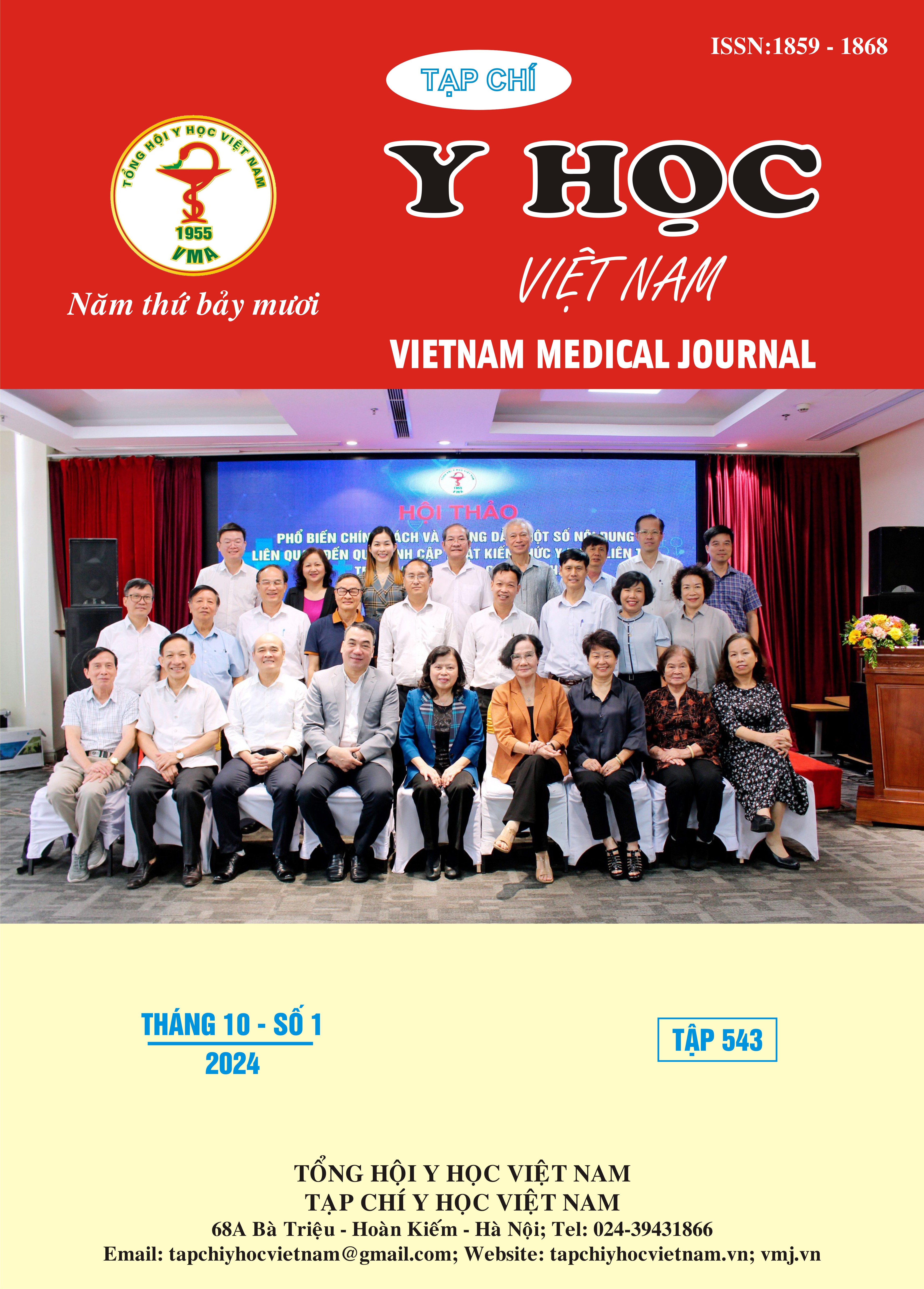THE ANALGESIC EFFECT OF PREGABALIN AFTER LAPAROSCOPIC COLORECTAL SURGERY
Main Article Content
Abstract
Introduction: Postoperative pain has a complex mechanism including somatic factors in combination with nerves. The general trend in the treatment of acute postoperative pain is multimodal analgesia, in which the role of pregabalin neuroleptics is of increasing interest. Objective: to evaluate the analgesic effect of pregabalin on acute pain after laparoscopic colorectal surgery. Subjects and Methods: This prospective, randomized, non-blind, controlled study was performed on 70 patients undergoing elective laparoscopic colorectal surgery. Patients were randomly assigned to 2 groups: pregabalin and control. The pregabalin group received an oral dose of pregabalin 150 mg 2 hours before surgery. Postoperative analgesia includes patient-controlled intravenous paracetamol, nefopam and morphine. Morphine intake, pain scores at rest, during exercise, and adverse events during the first 24 hours after surgery were recorded. Results: After laparoscopic colectomy, the amount of morphine consumed in the pregabalin group was statistically significantly lower than in the control group (19.8 mg ± 2.6mg and 22.1 mg ± 4.5 mg, p = 0.01). There were no differences in pain scores at rest, during exercise and in adverse events between the 2 groups. Conclusion: The administration of pregabalin resulted in reduction in morphine consumption after laparoscopic colectomy. The administration of pregabalin did not improve pain scores at rest, on movement and did not increase adverse effects
Article Details
Keywords
Pregabalin, laparoscopic colorectal surgery.
References
2. Chou R, Gordon DB (2016), "Management of Postoperative Pain: A Clinical Practice Guideline From the American Pain Society, the American Society of Regional Anesthesia and Pain Medicine, and the American Society of Anesthesiologists' Committee on Regional Anesthesia, Executive Committee, and Administrative Council", The Journal of Pain, 17(2), pp. 131-157.
3. Gustafsson U, Scott M (2019), "Guidelines for perioperative care in elective colorectal surgery: Enhanced Recovery After Surgery (ERAS®) Society recommendations: 2018", World journal of surgery, 43(3), pp. 659-695.
4. Bockbrader HN, Wesche D(2010), "A Comparison of the Pharmacokinetics and Pharmacodynamics of Pregabalin and Gabapentin", Clinical Pharmacokinetics, 49(10), pp. 661-669.
5. Chincholkar M (2018), "Analgesic mechanisms of gabapentinoids and effects in experimental pain models: a narrative review", British Journal of Anaesthesia, 120(6), pp. 1315-1334.
6. Amiri H, Mirzaei M (2016), "Three-Agent Preemptive Analgesia, Pregabalin-Acetaminophen-Naproxen, in Laparotomy for Cancer: A Randomized Clinical Trial", Anesthesiology and pain medicine, 7(2), pp. e33269-e33269.
7. Baloyiannis I, Theodorou E (2020), "The effect of preemptive use of pregabalin on postoperative morphine consumption and analgesia levels after laparoscopic colorectal surgery: a controlled randomized trial", The International Journal of Colorectal Disease, 35(2), pp. 323-331.
8. Đặng Thanh Bình, Phạm Văn Đông (2019), "Vai trò của Pregabalin trong giảm đau đa mô thức sau phẫu thuật cột sống", Y học Thành phố Hồ Chí Minh, 23(4),tr. 71-77.
9. Nguyễn Thành Sang (2018), Vai trò của Pregabalin trong giảm đau đa mô thức sau mổ mở vùng bụng trên Luận văn tốt nghiệp bác sĩ nội trú, Đại học Y Dược Thành phố Hồ Chí Minh.
10. Hu J, Huang D (2018), "Effects of a single dose of preoperative pregabalin and gabapentin for acute postoperative pain: a network meta-analysis of randomized controlled trials", Journal of pain research, 11, pp. 2633-2643.


